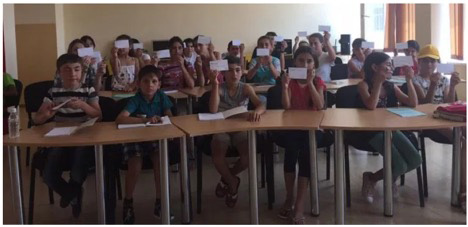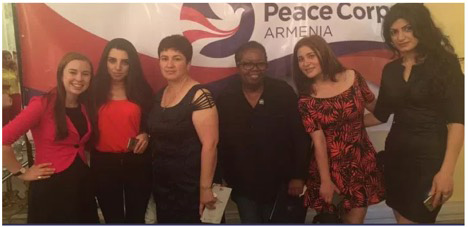Amanda in Armenia: Bridging the gap
There are seven women sitting in a sweltering hot room, sweating like crazy but happy to be there. These women are part of a partnership with COAF (Children of Armenia Fund) and the British Council.
This is a meeting of the Rural Teacher Development Project that is working to strengthen resources and skills in rural classrooms by giving teachers extensive training. The women participating have stuck out this pilot program for over a year, completing many extensive trainings in the process and taking time away from their homes and families because they are dedicated to their jobs.
The women attending are proud to be here and I am equally as proud to be learning from dedicated and experienced teachers. Trainings like these are what Peace Corps volunteers love to see. People from their host country who are eager to improve the lives of the next generation. Some days as a Peace Corps volunteer, I don’t feel like I have accomplished much, but this is NOT one of those days. This partnership is worthwhile and these women have much more to teach me than I have to teach them.

Higbee’s class in Armenia.
Half an hour into our full day of training we are reviewing the long-term plan via Power Point. We are in a special SMART classroom designed and paid for by COAF. This is a resource most communities in Armenia don’t have so we are taking full advantage of it.
Our presenter is mid-sentence when the electric goes out. We all sigh. Even though I’ve only been here three months, I know power outages are not just a quick flicker. Often the electric will go out around 11 am without warning and not return until 5 or 6 in the evening.
We send someone down to the director’s office. He calls someone else on his smart phone and they confirm that the electric will be out until 5 pm that day. Sadly, this is a normal occurrence multiple times a week in almost every Armenian village.
We try to salvage at least half a day of training. I have my portable Wi-Fi pod and our presenter has some battery left on his computer. We all crowd around the small screen and attempt to still take advantage of the time and effort we spent to get there. (Since women do not typically drive here, arranging transportation is somewhat of a hassle).

Amanda Higbee and other Peace Corps members in Armenia.
This situation highlights one of the fundamental problems in Armenia. Somewhere there is a disconnect, a gap. Most homes have computers, cell phones (usually a smart phone) and often internet access. This is true of even the poorest villages. My school has a beautiful, newly renovated computer lab with a projector and SMART board, yet often when I attempt to hold an English club, there is no working electric and we cannot use this technology.
Speaking of the computer lab in my school: it is a wonderful resource for my students. In the modern era, children MUST have access to these things in some way. Yet despite this wonderful technology, none of my students know how to type. They have never had access to a computer class to teach them how to use Microsoft Office, how to type or how to use the internet safely. They do not know how to use Google Docs and have never learned how to properly compose an email. (Instead chess is a required subject for all Armenian children).
Armenians do not want to be left behind in the modern era. Armenia parents want their children to learn and be successful. Many families have the ability to give their children great tool like tablets, computers and smart phones. Armenia is in many ways, longing to be a part of the modern world. But until basic infrastructure problems like electric are solved, Armenia will be caught in limbo. What I have witnessed in my time here is a country full of people who are capable of so much, and yet they lack basic things like reliable electricity. This is not the fault of the people but if I were being honest, I do not know enough about the country to know who or what to blame. Is it the fault of a power plant? The fault of the government for not stepping in? Like most things, I am sure it is a complicated problem without a single solution. The only thing I can do as a Peace Corps volunteer is to work with what I have when I have it and let go of what I cannot control.
Peace Corps volunteers have been placed in Armenia to help bridge gaps like this one, and that is what we will continue to do.